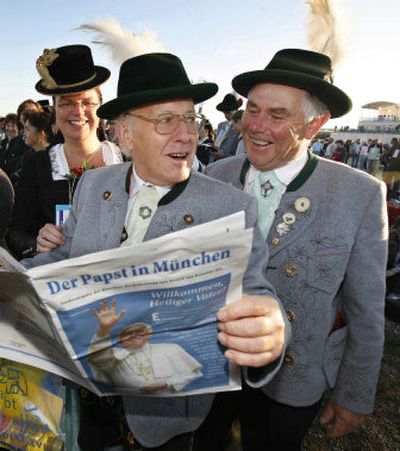On visit home, pope warns against reliance on science

MUNICH, Germany – Under glorious skies in this Bavarian capital where he once lived, Pope Benedict XVI on Sunday warned Catholics against letting modern concerns drown out God’s word, adding that technology alone cannot solve the world’s problems.
Over-reliance on science has made too many Catholics deaf to the teachings of the Church, the pope said in a homily that scolded Western European societies for their increasingly secular focus. Faith is also needed to combat diseases such as AIDS, he said.
On the second day of his six-day homecoming pilgrimage, the pope spoke to some 250,000 followers at a huge open-air Mass in fairgrounds on the outskirts of Munich. Some of the faithful arrived before dawn to secure a good spot and many waved posters in the Vatican’s colors of yellow and white or signs with slogans of welcome for the German pope.
The crowd included families with small children and scores of people in Alpine folk dress – women in dirndls and men in wool stockings with feathers in their caps. They warmly cheered the hometown pope, who wore Kelly-green vestments and a gold-trimmed miter and spoke from an austere, imposing stage. But the audience was generally a less boisterous bunch than often greets the pontiff.
Benedict’s native Bavaria is a prosperous and conservative state in southern Germany that was once a bastion of Catholicism in central Europe. He will also visit his birthplace, his parents’ gravesites and the university where he once taught theology.
While he has described the trip as a highly personal one, the former Joseph Ratzinger is also determined to boost a faith that by most measures is flagging in Europe, where Catholics have wandered from the church and Muslim immigrants have also mixed with traditionally Christian demographics.
Catholics must make God “the force shaping our lives and actions,” he said, but many do not know how or do not like the image of God they have come to know.
He lamented cynics who consider “mockery of the sacred to be an exercise of freedom.”
“Put simply, we are no longer able to hear God – there are too many different frequencies filling our ears,” he said. “What is said about God strikes us as pre-scientific, no longer suited to our age.”
Even Catholic charities that do good works in Africa and other parts of the developing world but fail to teach Christianity are at fault, Benedict said, pointing an accusing finger directly at the German church. He said African bishops frequently thank him for aid and development projects by German Catholic groups but then long for an evangelical component as well.
“Social issues and the Gospel are inseparable. When we bring people only knowledge, ability, technical competence and tools, we bring them too little,” he said.
“People in Africa and Asia admire our scientific and technical prowess, but at the same time they are frightened by a form of rationality which totally excludes God from man’s vision.”
Similarly, Benedict said, “hearts must be converted” to fight the AIDS epidemic by “realistically facing its deeper causes.”
He was alluding to the Church’s position that fidelity and chastity, not condoms, are the way to combat the disease.
Benedict’s more conservative views are not popular among liberals in Germany and other parts of Europe. He has also become the subject of protesters. Early Sunday, vandals splashed blue paint on the house where he was born.